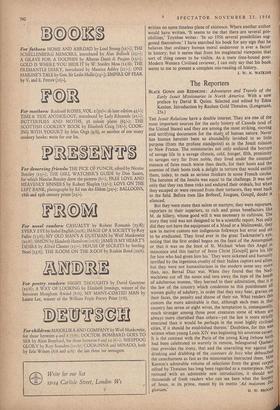The Reporters
BLACK GOWN AND REDSKINS: Adventures and Travels of the Early Jesuit Missionaries in North America. With a new preface by David B. Quinn. Selected and edited by Edna Kenton. Introduction by Reuben Gold Thwaites. (Longmans, 25s.) THE Jesuit Relations have a double interest. They are one of the most important sources for the early history of Canada (and of the United States) and they are among the most striking, moving and terrifying documents for the study. of human nature. Never has human heroism been so abundantly lavished to so little purpose (from the profane standpoint) as in the Jesuit mission to New France. The missionaries not only endured the horrors of savage life in a savage climate, cold, hunger, filth, proximity to savages very far from noble, they lived under the constant menace of fates much worse than death, for their hosts and the enemies of their hosts took a delight in torture that would entitle them, today, to rank as serious thinkers in some French circles. The heroism of the Jesuits was equal to the challenge. It was not only that they ran these risks and endured their ordeals, but when they escaped or were rescued from their torturers, they went back to the field. Before men like Br6beuf, Jougues, Goupil, doubt is silenced.
But they were more than saints or martyrs; they were reporters, reporters to their superiors, to rich and pious benefactors like M. de Sillery, whose good will it was necessary to cultivate. The story they told was not designed to be a scientific report. Not only did they not have the equipment of a Mead or a Malinowski, they saw in native custom not indigenous folkways but error and sin to be eradicated. They lived ever in the great Taskmaster's eye, noting that the first ordeal began on the feast of the Assumption or that it was on the feast of St. Michael 'when this Angel in innocence and this martyr of Jesus Christ [Goupil] gave his life for him who had given him his.' They were sickened and humanly terrified by the ingenious cruelty of their Indian captors and allies, but they were not humanitarians in the modern sense any more than, say, Bernal Diaz was. When they found that the Nad.. wechiwec cut off the noses and tore away the tops of the heads of adulterous women, 'they learned to their admiration, that it is the law of the country which condemns to this punishment all women guilty of adultery, in order that they may bear, graven on their faces, the penalty and shame of their sin. What renders this custom the more admirable is that, although each man in that country has seven or eight wives, the temptation is, consequently, much stronger among those poor creatures some of whom art always more cherished than others—yet the law is more stria)/ executed than it would be perhaps in the most highly civilised cities, if it should be established therein.' Doubtless, for this Was written when young Louis XIV was beginning his amorous career. It is the contrast with the Paris of the young King (whose birth had been celebrated so warmly in remote, beleaguered Quebec) that provides the irony, that and the unavailing war against the drinking and drabbing of the coiffeurs de bois who debauched the catechumens as fast as the missionaries instructed them. Miss Kenton's admirable volume of selections from the great corpus edited by Thwaites has long been regarded as a masterpiece. No!' reissued with an admirable new introduction, it should Will thousands of fresh readers who by see here what the SocietY. of Jesus, in its prime, meant by its motto 'Ad majorem Del










































































 Previous page
Previous page